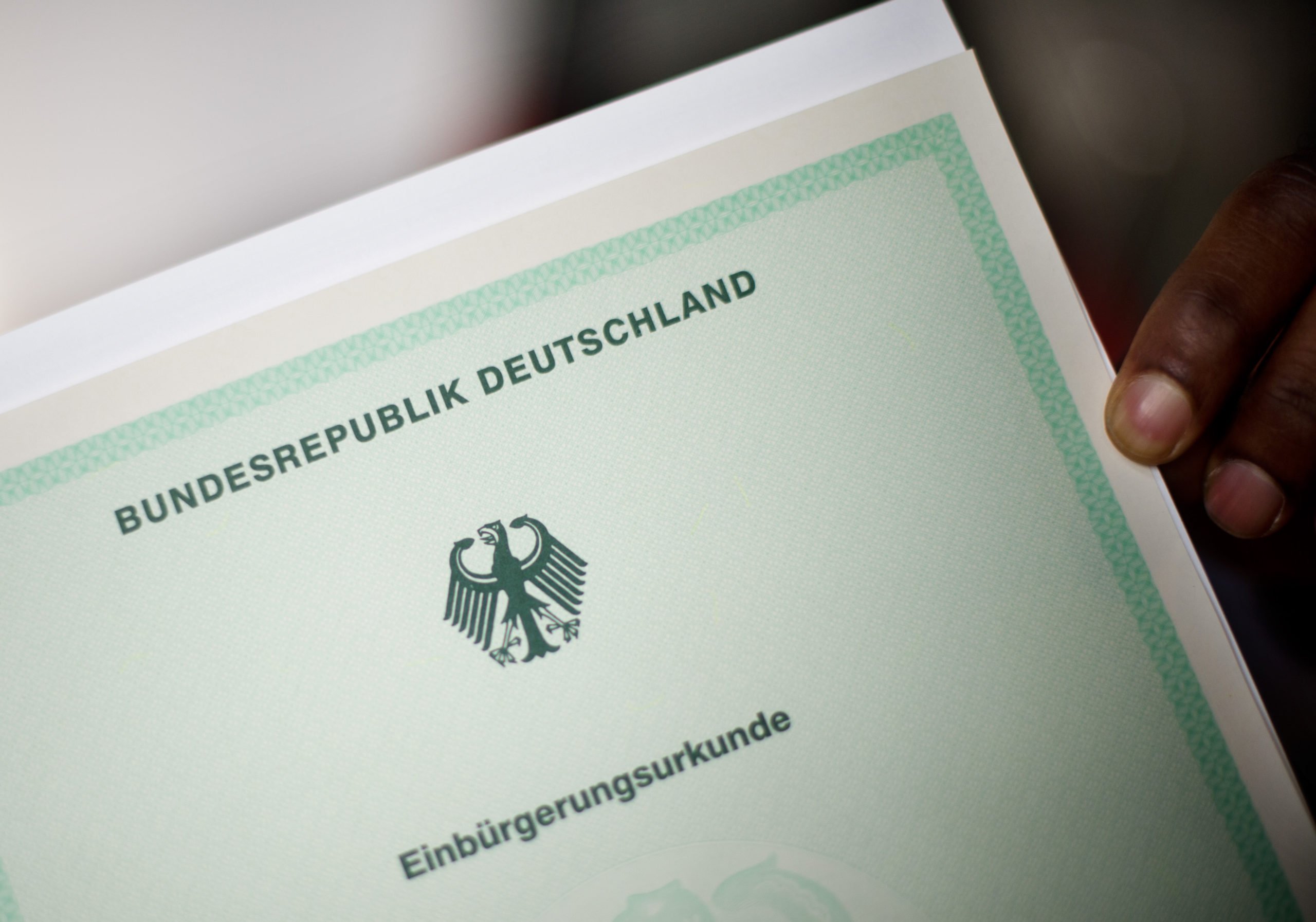'Two years is normal': How Germany's citizenship process leaves foreigners hanging

Foreigners who want to get citizenship in Germany face many obstacles, including long waits and requests for obscure paperwork. Why does the process take so long - and is it putting people off from applying?
In February 2020 Mahmoud*, who originally comes from the Middle East, sent off the application for himself and his family to become German citizens.
After almost seven years spent in Germany, the family not only met the necessary requirements, they felt German. “One of my children was born here,'' he says. “They speak only German at home.”
He received confirmation from the Berlin office that his application had been received after three months... and then nothing.
Almost two years later, in February of this year, he finally received a response on his request for dual citizenship.
READ ALSO: Why Germany's reform of dual citizenship laws can't come soon enough
“In the first two lines they apologised for the delay,” he recalls. “They said that it was due to the pandemic and a lack of personnel.”
The office also informed Mahmoud that it couldn’t accept his application because he intended to keep his home nationality. The case worker told him he'd have to chose between the two.

A person holds a German and British passport. Many foreigners in Germany want dual citizenship. Photo: picture alliance/dpa | Britta Pedersen
He is now challenging that decision - he believes he qualifies for dual nationality due to the financial costs that would be involved in giving up his nationality of birth - but he doesn’t expect to hear any decision for months.
In the meantime, the fact that he doesn’t have a German passport is costing him opportunities at work. His employer would like him to travel outside the EU but that isn't easy with his current passport.
'Two years is normal'
Mahmoud’s plight is one that many people who have applied for German citizenship will probably identify with.
While exact figures on how long it takes to get citizenship are hard to come by, anecdotal evidence suggests that those who apply need to be have high levels of endurance.
“I think the longest one I’ve heard about is three years,” says German resident Dina*, who's also from the Middle East and set up a social media support group for people to share experiences after she became frustrated with waiting for months on a reply. “But two years is very normal.”
Members of her group often complain that it is impossible to make an appointment online, or they are informed that slots are booked up for the rest of the year.
“Besides the long waiting times, the most annoying thing for people is the lack of transparency and the fact that you don’t know what’s going on or what stage your application is at,” she says.
She herself has been waiting for almost three years for a decision and has no idea whether she'll find out in the next days or weeks, or whether it will take months before she has clarity.
“You are given the impression that naturalisation isn't high up Germany’s list of priorities,” she remarks.
READ ALSO: ‘European again’: How changes to citizenship rules will affect Brits in Germany
No proper data collection
Naturalisation, or Einbürgerung, is a process that is dealt with at the district level in Germany, with little oversight from state governments.
The Local asked eight of Germany’s 16 federal states, including Berlin, Hamburg, North Rhine-Westphalia and Bavaria, to provide details on how many applications for nationality are made each year and how many are successful - and only two came back with comprehensive answers.
The rest stated that they are “under no legal obligation” to collect the information we were asking for.

A man holds a German naturalisation certificate. Photo: picture alliance/dpa | Julian Stratenschulte
But district-by-district information for Berlin that the city was pushed into releasing last year reveals just what a lottery the naturalisation application can be.
While authorities in the District of Treptow-Köpernick claim to confirm that they’ve received an application within one to three working days, in the district of Pankow this initial step happens “within six months.”
Steglitz-Zehlendorf, where Mahmoud applied, claims to confirm receipt “within a few days”. In his case it took almost three months.
There are also huge discrepancies between the Berlin districts in the time it takes between the receipt of the application and the day on which the applicant hears whether they have gained citizenship.
Those who apply in Pankow should be prepared to wait 18 to 24 months while in the central district of Mitte the whole process is typically done and dusted in four months.
Staff shortages
One reason why some local governments perform so poorly is chronic understaffing.
As Germany becomes more ethnically diverse, ever more people are applying for nationality. At the same time though, districts are not employing enough new staff to cope with the backlog of cases.
In the Berlin district of Friedrichshain-Kreuzberg, for instance, applications went up by 44 percent between 2016 and 2020, from 874 applications for citizenship to 1,266. But the number of positive decisions only increased by 22 percent in the same period.
This pattern is repeated elsewhere in the country.
Statistics the city of Hamburg provided to the Local show that close to double the number of applications were made last year compared to the number of positive decisions. Given that only a handful of applications are rejected - just 43 from 9,500 applications - it is clear that the the reason people aren't getting citizenship is because no decision is being made at all.
Johannes Brandstäter, an expert on migration at the Diakonie charitable association, says that a lack of staff is one of the key factors behind the big differences in processing times.
“If there is not enough personnel then applications take a very, very long time,” he says. “Take the example of Kiel, which has really pushed citizenship but has also employed more staff. They have a high level of naturalisation and are something of a paragon.”
On the other hand, he says that Berlin has put money into publicity campaigns but still suffers from chronic staff shortages. The result is that people struggle to even book an initial consultation in the capital.

People enjoy the sun in Berlin. Chronic understaffing of immigration offices is a problem in some areas. Photo: picture alliance/dpa | Carsten Koall
'Not really wanted'
There are other reasons why applications can take so long.
The Migration Integration Policy Index, an international comparison of countries’ integration policies, gives Germany poor marks on its laws governing naturalisation.
Not only is Germany the last major migrant destination to have a general ban on dual citizenship, rules around independent income and state welfare receipt “are major factors behind Germany’s below-average naturalisation rates,” the study has found.
The new 'traffic light' coalition government is planning to streamline the process by, among other things, abolishing the ban on dual nationality. For now though, conditions that include being “financially independent” or proving that one is “integrated into German society” appear to be clogging up the system.
READ ALSO: What's the latest on Germany's dual citizenship laws?
A lot of the speed of processing also seems to lie with the individual case worker.
At the Diakonie’s 500 nationwide counselling centres, people trying to gain citizenship often complain about the hurdles involved and the fact that officials demand obscure paperwork from them.
“They have wiggle room to interpret the rules,” says Brandstäter, who notes that the rules governing dual nationality are often interpreted more strictly for people from some countries than they are from others.
“Many people have the impression that their applications are not really wanted,” he adds.
Ultimately, he says that the rules and the way caseworkers interpret them are so “daunting” that many people don’t even start to apply for citizenship.
“There are some five million people in Germany who could become citizens, but for various reasons don’t do so. That’s five million people without full legal equality through a German passport, that's pretty extreme.”
‘Determined’
Mahmoud has consulted a lawyer who is helping him prove that he would stand to suffer significant financial losses were he to lose his home nationality.
“The issue is with the case worker. She says she has never heard of someone with my nationality being given dual citizenship,” he says. “But if she were to look into the data bank of the Berlin Senate she would see that that isn’t the case.”
He says that he is “determined” to see the application through, even if it ends up taking many more months.
*Names of some our interviewees have been changed to protect their identity as they continue through the naturalisation process.
Comments
See Also
In February 2020 Mahmoud*, who originally comes from the Middle East, sent off the application for himself and his family to become German citizens.
After almost seven years spent in Germany, the family not only met the necessary requirements, they felt German. “One of my children was born here,'' he says. “They speak only German at home.”
He received confirmation from the Berlin office that his application had been received after three months... and then nothing.
Almost two years later, in February of this year, he finally received a response on his request for dual citizenship.
READ ALSO: Why Germany's reform of dual citizenship laws can't come soon enough
“In the first two lines they apologised for the delay,” he recalls. “They said that it was due to the pandemic and a lack of personnel.”
The office also informed Mahmoud that it couldn’t accept his application because he intended to keep his home nationality. The case worker told him he'd have to chose between the two.

He is now challenging that decision - he believes he qualifies for dual nationality due to the financial costs that would be involved in giving up his nationality of birth - but he doesn’t expect to hear any decision for months.
In the meantime, the fact that he doesn’t have a German passport is costing him opportunities at work. His employer would like him to travel outside the EU but that isn't easy with his current passport.
'Two years is normal'
Mahmoud’s plight is one that many people who have applied for German citizenship will probably identify with.
While exact figures on how long it takes to get citizenship are hard to come by, anecdotal evidence suggests that those who apply need to be have high levels of endurance.
“I think the longest one I’ve heard about is three years,” says German resident Dina*, who's also from the Middle East and set up a social media support group for people to share experiences after she became frustrated with waiting for months on a reply. “But two years is very normal.”
Members of her group often complain that it is impossible to make an appointment online, or they are informed that slots are booked up for the rest of the year.
“Besides the long waiting times, the most annoying thing for people is the lack of transparency and the fact that you don’t know what’s going on or what stage your application is at,” she says.
She herself has been waiting for almost three years for a decision and has no idea whether she'll find out in the next days or weeks, or whether it will take months before she has clarity.
“You are given the impression that naturalisation isn't high up Germany’s list of priorities,” she remarks.
READ ALSO: ‘European again’: How changes to citizenship rules will affect Brits in Germany
No proper data collection
Naturalisation, or Einbürgerung, is a process that is dealt with at the district level in Germany, with little oversight from state governments.
The Local asked eight of Germany’s 16 federal states, including Berlin, Hamburg, North Rhine-Westphalia and Bavaria, to provide details on how many applications for nationality are made each year and how many are successful - and only two came back with comprehensive answers.
The rest stated that they are “under no legal obligation” to collect the information we were asking for.

But district-by-district information for Berlin that the city was pushed into releasing last year reveals just what a lottery the naturalisation application can be.
While authorities in the District of Treptow-Köpernick claim to confirm that they’ve received an application within one to three working days, in the district of Pankow this initial step happens “within six months.”
Steglitz-Zehlendorf, where Mahmoud applied, claims to confirm receipt “within a few days”. In his case it took almost three months.
There are also huge discrepancies between the Berlin districts in the time it takes between the receipt of the application and the day on which the applicant hears whether they have gained citizenship.
Those who apply in Pankow should be prepared to wait 18 to 24 months while in the central district of Mitte the whole process is typically done and dusted in four months.
Staff shortages
One reason why some local governments perform so poorly is chronic understaffing.
As Germany becomes more ethnically diverse, ever more people are applying for nationality. At the same time though, districts are not employing enough new staff to cope with the backlog of cases.
In the Berlin district of Friedrichshain-Kreuzberg, for instance, applications went up by 44 percent between 2016 and 2020, from 874 applications for citizenship to 1,266. But the number of positive decisions only increased by 22 percent in the same period.
This pattern is repeated elsewhere in the country.
Statistics the city of Hamburg provided to the Local show that close to double the number of applications were made last year compared to the number of positive decisions. Given that only a handful of applications are rejected - just 43 from 9,500 applications - it is clear that the the reason people aren't getting citizenship is because no decision is being made at all.
Johannes Brandstäter, an expert on migration at the Diakonie charitable association, says that a lack of staff is one of the key factors behind the big differences in processing times.
“If there is not enough personnel then applications take a very, very long time,” he says. “Take the example of Kiel, which has really pushed citizenship but has also employed more staff. They have a high level of naturalisation and are something of a paragon.”
On the other hand, he says that Berlin has put money into publicity campaigns but still suffers from chronic staff shortages. The result is that people struggle to even book an initial consultation in the capital.

'Not really wanted'
There are other reasons why applications can take so long.
The Migration Integration Policy Index, an international comparison of countries’ integration policies, gives Germany poor marks on its laws governing naturalisation.
Not only is Germany the last major migrant destination to have a general ban on dual citizenship, rules around independent income and state welfare receipt “are major factors behind Germany’s below-average naturalisation rates,” the study has found.
The new 'traffic light' coalition government is planning to streamline the process by, among other things, abolishing the ban on dual nationality. For now though, conditions that include being “financially independent” or proving that one is “integrated into German society” appear to be clogging up the system.
READ ALSO: What's the latest on Germany's dual citizenship laws?
A lot of the speed of processing also seems to lie with the individual case worker.
At the Diakonie’s 500 nationwide counselling centres, people trying to gain citizenship often complain about the hurdles involved and the fact that officials demand obscure paperwork from them.
“They have wiggle room to interpret the rules,” says Brandstäter, who notes that the rules governing dual nationality are often interpreted more strictly for people from some countries than they are from others.
“Many people have the impression that their applications are not really wanted,” he adds.
Ultimately, he says that the rules and the way caseworkers interpret them are so “daunting” that many people don’t even start to apply for citizenship.
“There are some five million people in Germany who could become citizens, but for various reasons don’t do so. That’s five million people without full legal equality through a German passport, that's pretty extreme.”
‘Determined’
Mahmoud has consulted a lawyer who is helping him prove that he would stand to suffer significant financial losses were he to lose his home nationality.
“The issue is with the case worker. She says she has never heard of someone with my nationality being given dual citizenship,” he says. “But if she were to look into the data bank of the Berlin Senate she would see that that isn’t the case.”
He says that he is “determined” to see the application through, even if it ends up taking many more months.
*Names of some our interviewees have been changed to protect their identity as they continue through the naturalisation process.
Join the conversation in our comments section below. Share your own views and experience and if you have a question or suggestion for our journalists then email us at [email protected].
Please keep comments civil, constructive and on topic – and make sure to read our terms of use before getting involved.
Please log in here to leave a comment.